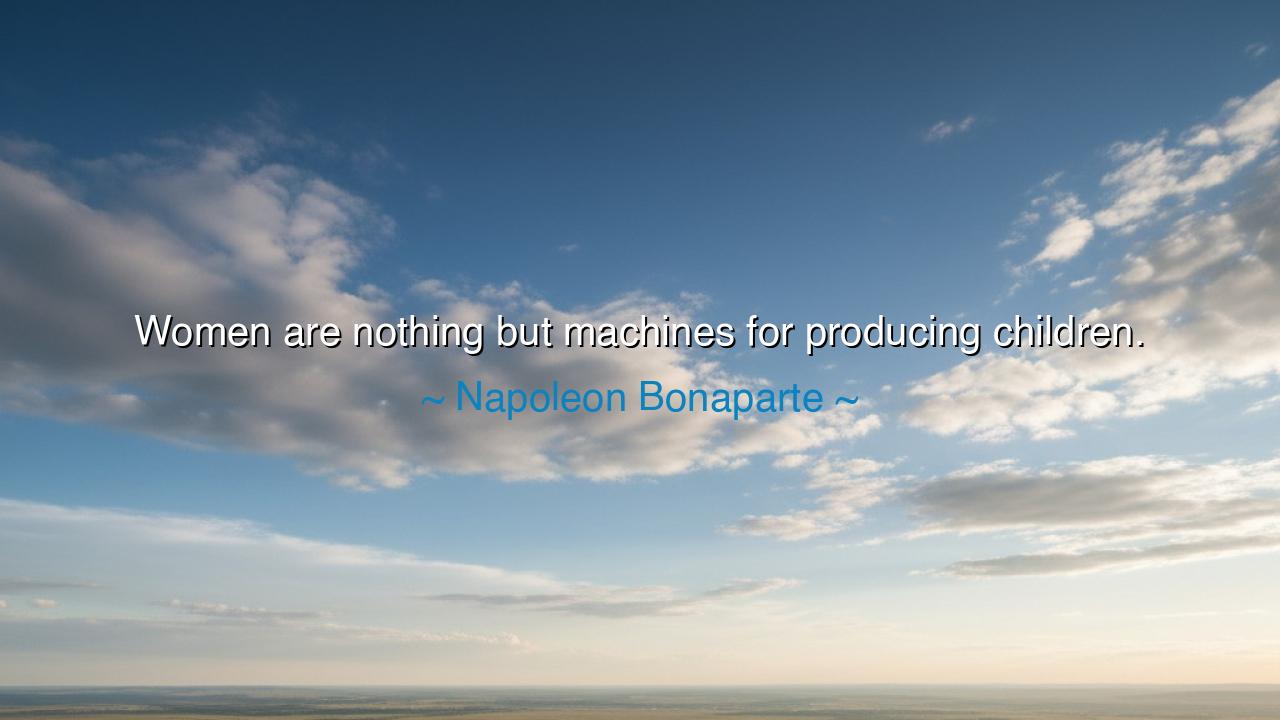
Women are nothing but machines for producing children.






Napoleon Bonaparte, emperor of France and conqueror of Europe, once declared with chilling bluntness: “Women are nothing but machines for producing children.” These words, harsh and cold, reveal the shadow within his vision of power. To him, women were bound to the service of empire, their worth measured not in spirit, mind, or freedom, but in their ability to bring forth soldiers for his armies and heirs for his dynasties. It is a statement not of wisdom, but of utility—an emperor’s gaze that saw wombs as engines of conquest rather than sanctuaries of life.
The meaning of this quote must be read not as truth, but as testimony to the era’s flaws. For in Napoleon’s time, many rulers treated women as instruments of lineage and politics, binding them to roles of bearing children to strengthen bloodlines and nations. Napoleon’s words thus reflect the cold logic of power, where love, individuality, and equality were cast aside in favor of dynastic necessity. In them we see how greatness of military genius can coexist with blindness of heart.
History offers sharp contrast to this view. Consider Queen Elizabeth I of England, who never married, never bore children, yet ruled with unmatched strength. She was no “machine,” but a sovereign whose intellect and will shaped an age. Or think of Joan of Arc, who, though never a mother, carried the fate of France upon her shoulders with divine fire. Such women stand as living proof against Napoleon’s words, showing that worth is not bound to childbirth, but to courage, vision, and spirit.
Yet Napoleon’s utterance carries value as a warning. It shows us how easy it is for societies to reduce human beings to functions—women to machines, men to soldiers, the poor to laborers. When power views people only as tools, humanity withers, and greatness turns to tyranny. His empire, though vast, fell in ruin, a reminder that those who build upon dehumanization plant seeds of collapse.
Let this lesson endure: no human soul is a machine. Women are not instruments of lineage but bearers of wisdom, love, and destiny in their own right. The ancients teach us that to dishonor half of humanity is to wound the whole. Napoleon’s words, remembered now, are not to be imitated, but to be judged—and to remind us to guard against any age, ancient or modern, that would reduce the sacred to the mechanical. True greatness is not in conquering nations, but in honoring the dignity of every soul.






PCPhuong Cao
Napoleon’s statement seems to strip women of their identity and reduce them to just one biological function, which is not only disrespectful but also incredibly limiting. How do we move past these archaic views and shift our thinking to truly appreciate women for all that they are? Isn’t it time we redefine the value of women in society, focusing on their intellectual, emotional, and social contributions instead of merely their reproductive capabilities?
DTdat tran
It’s hard to comprehend that someone of Napoleon’s stature could have such a narrow view of women. While this quote may have reflected the norms of his era, it’s concerning that echoes of such beliefs persist in certain parts of the world today. Shouldn’t we be working toward a society that celebrates women’s contributions beyond childbirth, such as their impact in education, business, and leadership?
HLNGUYEN TRAN HA LINH
This quote is a stark reminder of the patriarchal beliefs that have shaped much of history. It reduces women to a single, biological function, ignoring the depth of their potential. How do we ensure that such reductive views are not perpetuated? How can education and activism challenge these harmful ideas and emphasize the importance of viewing women as full, multifaceted human beings?
THduong the hoa
It’s disturbing to think about how this quote perpetuates the notion that women are only valuable for their ability to have children. Does this mean that women who choose not to have children, or who cannot for various reasons, are somehow less valuable? How can we challenge these harmful views and shift the narrative to embrace women’s multifaceted roles in modern society?
CBnguyen cong bang
Napoleon’s quote reflects a troubling, outdated perspective that objectifies women. It also highlights a historical view where women were often seen as property or tools for societal continuation, rather than as individuals with dreams, aspirations, and talents. Does this quote speak to the societal values of Napoleon’s time, or is it a reflection of a pervasive belief that still echoes in some parts of society today?